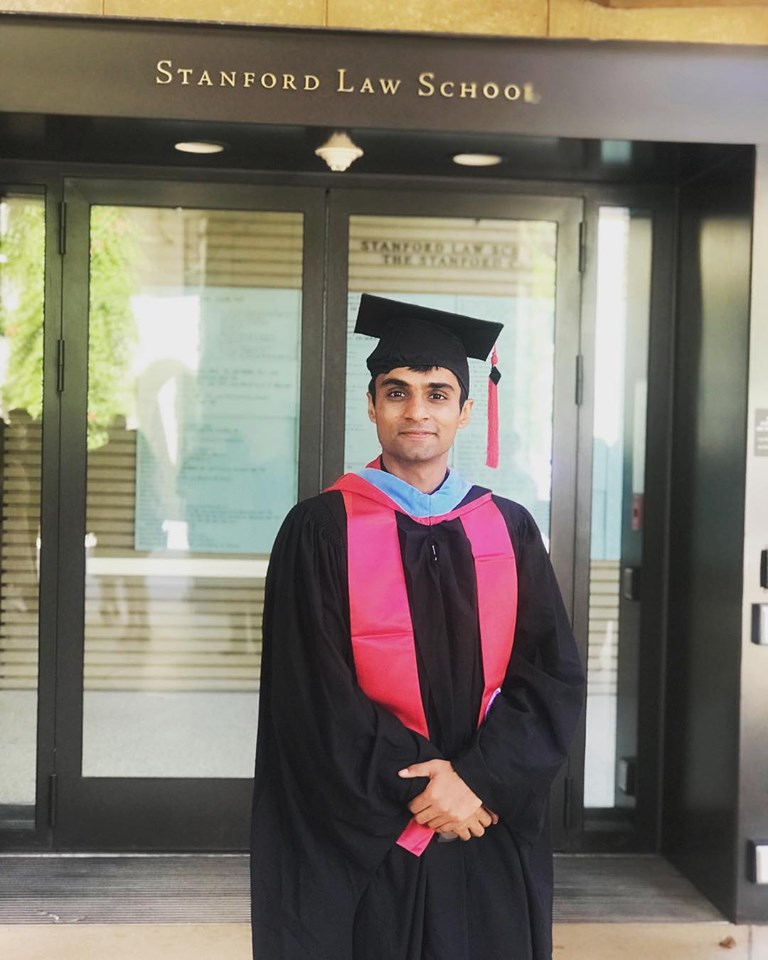“Do what you can with all you have, wherever you are.” None but Mohit Khubchandani could have proved this quote by Theodore Roosevelt true. We know him as an International Attorney at the United Nations Office for Coordination of Humanitarian Affairs and as a Legal Trainee at the New York State Supreme Court.
In this candid telephonic interview, Desi Kaanoon discussed the following aspects about his experience thus far:
[A] On his work experience in India and reasons to pursue an LL.M:
His journey from pursuing his Bachelors in Law at Indraprastha University to pursuing Masters in Law in International & Environmental Law at Stanford University has been very idealistic. One of the reasons he gave to move abroad for higher studies is the nascent stage of Public International Law, International Arbitration and Environmental jurisprudence in India which he was inclined to pursue, and then bring back to the nation. What he realised after working under the tutelage of then Attorney General for India and Mr. Nikhil Rohatgi, whom he considers his gurus (mentors) which led to his exposure to litigation; is that the practice of domestic litigation is a great foundation which is imperative before catapulting into an International career as a practcioner. Besides that, he narrated that he was also fortunate to handle some International cases and arbitrations at the office.
His dean informed to him, that he happens to be the first person selected in Indraprastha University and Amity Law School’s two decades of existence to pursue a masters from Stanford University.
He primarily credits his admission to Stanford to a life changing philosophy of Nichiren Daishonin’s Buddhism, that gives him an ‘indomitable, never say never and an invincible spirit to keep on trying and failing with a big heart’. Besides that, he believes that his manifold passions in life, such as Moot Courts on the co-curricular front and also Theatre and Dance on the extra-curricular front are also reasons for his induction at Stanford which probably looks for all-rounded personalities.
He mentions that he never ran behind marks but excellence in each endeavour. He also feels grateful to have been elected as the President of his batch at Stanford.
[B] On his current experience at the New York Supreme Court:
He is practising law under the Civil Branch of New York State Supreme Court, equivalent to a District Court in India, which are unsurprisingly divergent with respect to the burden on them. At the Court he works at, the Hon’ble Judge sits for a hearing for a day per week prior to four days of groundwork. She gets briefs of the cases prepared by a government assigned Court Attorney, besides Law Clerks and Trainees. This, apart from saving time, also helps the briefs to be of excellent standard. He observed that, though Indian Courts by nature of the population inherently are burdened with a lot of cases; however, what courts can adopt, is to reduce the overanalysis and thereby cut down on lengthy judgments.
[C] On his current work-experience at the United Nations Headquarters:
Mr. Khubchandani, also having been an Advisor at the Permanent Mission of India to UN made an exhaustive analysis of the working of the UN from both sides of the coin – working on a country level; wherein formal meetings are conducted at the General Assembly and the Security Council and, informal ones comprising of delegates discussing the adoption of various resolutions with sponsors deciding on the language of their drafts; the stakeholders then negotiating its texts after which it is put to vote in GA or SC.
The second one, from the perspective of specialised agencies of UN; relating to coordinating and facilitating the work done by countries. His current work at the Central Emergency Response Fund of the UNOCHA includes analyses of International Environmental, Human Rights and Humanitarian Law to provide legal inputs to the fund in order to disburse money to climate disaster affected or civil-strife affected regions.
[D] Views of the Environmental lawyer on sustainability:
The public-spirited lawyer believes that environment sustainability fails because people are aware, yet ignorant about its degradation. Arousing their emotional sensitivity, appeasing their moral conscience and sharing of responsibility is the need of the hour. Each drop makes the ocean. Similarly, even small actions like proper waste disposal or carrying your own cloth-made bag to the supermarket can go a long way.
[E] Tips for Moot Courts:
Usually students struggle with their memorials during Moot Courts. According to him, what one ought to do is, is skip introductory laws, loose points and encircle the problematic areas in the moot problem to be dealt with. In moots related to International law, one has to specifically align her/his memorials according to Art. 38(1)(d) of the Statute of the International Court of Justice and refer books of writers like Ian Browlie, Malcolm Shaw and Oppenheim even before reading the Compromis. For oral arguments, he suggests: ‘Do not sound agitated when the Bench tries to put you down; rather stand to your ground. However, know the thin line of when to concede and move on in the case of weak points.’
He concludes by saying; “Be true to yourself and others; be kind and helping; it all comes back in inconspicuous ways.”
By- Priya Chaudhary

